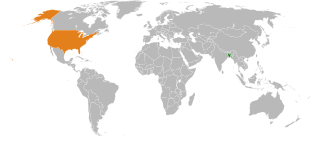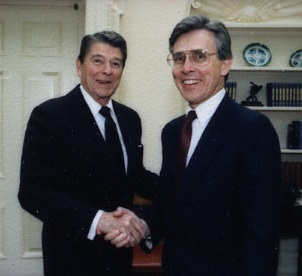Related Research Articles

A diplomatic mission or foreign mission is a group of people from a state or organization present in another state to represent the sending state or organization officially in the receiving or host state. In practice,the phrase usually denotes an embassy or high commission,which is the main office of a country's diplomatic representatives to another country;it is usually,but not necessarily,based in the receiving state's capital city. Consulates,on the other hand,are smaller diplomatic missions that are normally located in major cities of the receiving state. As well as being a diplomatic mission to the country in which it is situated,an embassy may also be a nonresident permanent mission to one or more other countries.
Archer Kent Blood was an American career diplomat and academic. He served as the last American Consul General to Dhaka,Bangladesh. He is famous for sending the strongly worded "Blood Telegram" protesting against the atrocities committed in the Bangladesh Liberation War. He also served in Greece,Algeria,Germany,Afghanistan and ended his career as chargéd'affaires of the U.S. Embassy in New Delhi,India,retiring in 1982.

A consul is an official representative of a government who resides in a foreign country to assist and protect citizens of the consul's country,and to promote and facilitate commercial and diplomatic relations between the two countries.

Bangladesh-United States relations are the bilateral relations between Bangladesh and the United States of America. For the United States,Bangladesh is the 38th largest goods supplier and 60th largest export market. For Bangladesh,the United States is the largest export market. The two countries signed a bilateral investment treaty in 1986. U.S. companies are the largest foreign investors in Bangladesh. The U.S. government is the leading contributor of humanitarian assistance in response to the Rohingya crisis. Both nations have announced similar views for a Free and Open Indo-Pacific.

Equatorial Guinea –United States relations are bilateral relations between Equatorial Guinea and the United States.

Sierra Leone –United States relations are bilateral relations between Sierra Leone and the United States.

The Embassy of the United States of America to Armenia is the diplomatic mission of the United States to Armenia. It is located adjacent to Lake Yerevan along the Yerevan-Etchmiadzin highway. The site occupies an area of 90,469 square meters;which is currently the second largest land parcel by area on which a U.S. Embassy had been built on when it was completed in 2005,after the embassy in Baghdad.

The Embassy of the United States of America in Dhaka is the diplomatic mission of the United States in Bangladesh. It is located in Baridhara. The embassy has 400 staff led by the US Ambassador to Bangladesh.

The Consular Agency of the United States in Bremen,also referred to as Consular Agency Bremen,was one of the American diplomatic missions to Germany until 2018. The unit offered limited services for U.S. citizens in areas including Bremen,Hamburg,Schleswig-Holstein,and Lower Saxony. Despite that,services such as the issuing of visas or emergency passports were not provided,but can be obtained only from the U.S. Embassy in Berlin,the Consulate General in Frankfurt or Munich.
The Embassy of Japan in Dhaka is the diplomatic mission of Japan in Bangladesh. Naoki Ito is the current ambassador of Japan in Bangladesh who was appointed on October in 2019.

Donald L. Heflin is an American diplomat who served as the United States Ambassador to Cape Verde from 2015 to 2018.

Trusten Frank Crigler was a career foreign service officer who became the US Ambassador to Rwanda from October 29,1976 until May 12,1979 and Ambassador to Somalia from June 3,1987 until April 1,1990.
Relations between the Kingdom of Sardinia and the United States began in 1802 with mutual recognition,but formal relations were not established until 1839. Diplomatic relations ceased in 1861 when Sardinia was incorporated into the Kingdom of Italy.
Relations between the Free Cities of Bremen,Lübeck,and Hamburg and the United States date back to 1790s when Hamburg became the first of the republics to recognized the U.S. on June 17,1790. Bremen followed suit on March 28,1794. Diplomatic relations were formally established in October 1853 when the U.S. received Rudolph Schleiden as Minister Resident of the Hanseatic Legation in Washington,D.C. Relations ended in 1868 as the republics joined North German Confederation.
References
- ↑ "Policy & History". U.S. Embassy in Bangladesh. Retrieved 1 February 2019.
- ↑ "Ada Evening News Newspaper Archives, Mar 11, 1964". newspaperarchive.com. Retrieved 1 February 2019.
- ↑ Bari, Mohammad Rezaul. "The Basket Case". Forum. The Daily Star. Retrieved 1 February 2019.
On January 14, 1972, while arguing for the need of early US recognition of Bangladesh in his telegram no. 158 to the US Department of State, Herbert D. Spivack, the then US consul general in Dhaka from the Pakistan era, referred to the "basket case," which by the time had already become public knowledge:
- ↑ "The Foreign Service Journal, August 1949" (PDF). afsa.org. Retrieved 1 February 2019.
- 1 2 3 Herz, Martin Florian; Diplomacy, Georgetown University Institute for the Study of (1986). Contacts with the Opposition. University Press of America. p. 11. ISBN 978-0-8191-5071-4 . Retrieved 1 February 2019.
- ↑ The Vietnam War in Newsprint-1968. Terry Lukanic. 2018. p. 40. Retrieved 1 February 2019.
- ↑ Steinberg, S. (2016). The Statesman's Year-Book 1963: The One-Volume Encyclopaedia of all nations. Springer. p. 879. ISBN 978-0-230-27092-3 . Retrieved 1 February 2019.
- ↑ Rust, William J. (2016). Eisenhower and Cambodia: Diplomacy, Covert Action, and the Origins of the Second Indochina War. University Press of Kentucky. pp. 245–. ISBN 978-0-8131-6745-9 . Retrieved 1 February 2019.
- ↑ "Herbert Daniel Spivack - People - Department History - Office of the Historian". history.state.gov. Retrieved 1 February 2019.
- ↑ Welles, Benjamin (5 April 1972). "Bangladesh Gets U.s. Recognition, Promise of Help". The New York Times. Retrieved 1 February 2019.
- ↑ "Delta Democrat Times Newspaper Archives, Mar 27, 1972". newspaperarchive.com. Retrieved 1 February 2019.
- ↑ Trumbull, Robert (19 May 1972). "A Toast Drunk in Tea, and Dacca Has a U.S. Embassy". The New York Times. Retrieved 1 February 2019.
- ↑ "Spivack, Herbert D." SFGate. 18 November 2004. Retrieved 1 February 2019.